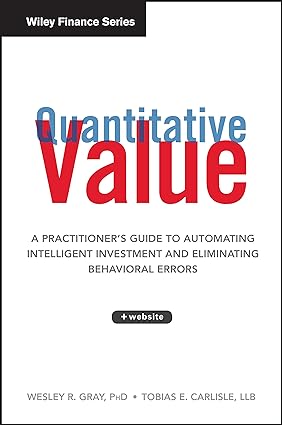Overview : Quantitative Value Book By Wesley R. Gray
-
Book Title: Quantitative Value
-
Author: Wesley R. Gray and Tobias E. Carlisle
-
Publication Date: November 2012
-
Rating: 4.5
-
price: $35.99
-
Pages: 304
Author Information
Wesley R. Gray, Ph.D., is the author of Quantitative Value: A Practitioner's Guide to Automating Intelligent Investment and Eliminating Behavioral Errors, an acclaimed investment expert blending academic research with practical strategies. As a former finance professor and founder of Alpha Architect, he specializes in systematic, evidence-based investing. Here is Book Review of Quantitative Value investing.
Introduction to Quantitative Value Book
In the ever-evolving landscape of financial markets, investors are constantly seeking new strategies to gain an edge. "Quantitative Value: A Practitioner's Guide to Automating Intelligent Investment and Eliminating Behavioral Errors" by Wesley R. Gray and Tobias E. Carlisle emerges as a beacon for those looking to blend traditional value investing principles with cutting-edge quantitative analysis. This comprehensive review explores how this book could revolutionize your approach to investing and personal finance.
Quantitative Value Book Summary
Gray and Carlisle present a compelling case for adopting a quantitative approach to value investing. They argue that by automating the investment process, investors can overcome cognitive biases and emotional decision-making that often lead to suboptimal outcomes. The authors provide a robust framework for building a quantitative value strategy, covering everything from stock selection to portfolio management.
"The goal is to create a systematic process that identifies undervalued stocks with strong fundamentals, effectively combining the best of both quantitative and value investing worlds."
Analysis of Key Themes
1. The Marriage of Value and Quant
The book expertly bridges the gap between traditional value investing and modern quantitative methods. This fusion is particularly relevant in today's market, where big data and machine learning are increasingly influencing investment decisions.
2. Behavioral Finance Insights
Gray and Carlisle delve deep into the psychology of investing, highlighting how cognitive biases can derail even the most experienced investors. Their analysis of market psychology is invaluable for understanding current market trends and investor behavior.
'
3. Systematic Approach to Investing
The authors outline a step-by-step process for creating a quantitative value strategy, covering:
- Valuation metrics selection
- Quality factor analysis
- Portfolio construction techniques
- Risk management strategies
This systematic approach is particularly useful for investors looking to refine their personal finance strategies and optimize their portfolios.
Writing Style and Accessibility
While the content is inherently complex, Gray and Carlisle manage to present their ideas in a clear, structured manner. They use real-world examples and case studies to illustrate complex concepts, making the material accessible to both seasoned professionals and ambitious retail investors.
Quantitative Value Book Strengths and Weaknesses
Strengths:
- Robust empirical evidence supporting the strategies
- Practical implementation guidance
- In-depth exploration of behavioral finance
Weaknesses:
- Some sections may be challenging for novice investors
- Limited discussion on the impact of macroeconomic factors
- Minimal coverage of emerging asset classes like cryptocurrencies
Quantitative Value Related Books
"Quantitative Value" stands out from traditional value investing books like Benjamin Graham's "The Intelligent Investor" by incorporating modern quantitative techniques. Compared to pure quant-focused works like "Inside the Black Box" by Rishi K. Narang, it offers a more balanced approach that respects value investing principles.
Relevance to Current Market Trends
In an era where algorithmic trading and robo-advisors are gaining prominence, this book's insights are particularly timely. It provides a framework for investors to compete in a market increasingly dominated by quantitative strategies while maintaining the core principles of value investing.
Author Information
Wesley R. Gray, Ph.D., is the CEO of Alpha Architect, a quantitative asset management firm. Tobias E. Carlisle is the founder of The Acquirer's Multiple®, an investment strategy inspired by deep value investing. Both authors bring a wealth of academic and practical experience to their work.
Highlights from Quantitative Value
Systematic Investing: Advocates for a structured, rules-based approach to minimize emotional and behavioral biases in investing.
Quantitative Analysis: Emphasizes the power of quantitative methods to identify undervalued stocks and potential high returns.
Value Metrics: Uses data-driven valuation metrics to identify quality companies at a discount, rather than relying on subjective analysis.
Behavioral Errors: Highlights common investor errors, such as overconfidence and loss aversion, and methods to avoid them.
Automated Process: Encourages automating investment strategies to maintain discipline and consistency.
Long-Term Focus: Stresses patience and a long-term view as essential for successful value investing outcomes.
Conclusion
"Quantitative Value" is an essential read for investors looking to elevate their strategy in the modern financial landscape. By combining time-tested value principles with cutting-edge quantitative methods, Gray and Carlisle offer a roadmap for more disciplined, emotion-free investing. Whether you're managing your personal finances or working in institutional investing, this book provides valuable insights to enhance your investment process.





